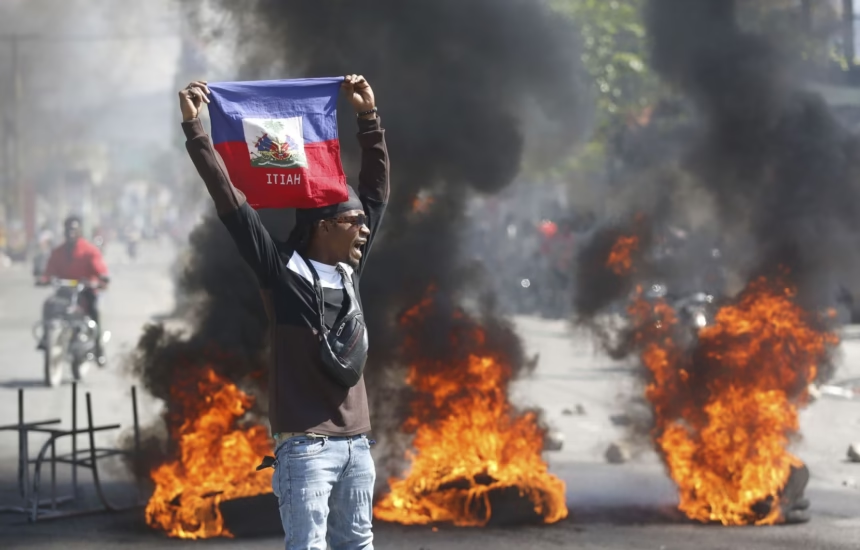Two men vanished. Dozens of weapons disappeared. And the government has remained silent. What began as a covert mission by a private American security company in Haiti has ended in tragedy. The New York Times has revealed details of a highly secretive and poorly managed operation with deadly consequences.
As the security situation in Haiti deteriorated, the Haitian government—then led by Prime Minister Garry Conille—quietly signed a contract with Studebaker Defense, a U.S. military company led by retired senior officers. What was meant to be a technical assistance operation devolved into a failed mission marked by the disappearance of two Haitian American collaborators and the theft of 72 military-grade weapons.
The affair, which had been kept under wraps for months, came to light in a New York Times investigation published on August 2.
According to accounts gathered by the newspaper, the Studebaker operation was carried out with extreme secrecy and minimal oversight in a country riddled with corruption and collusion between law enforcement and criminal gangs.
A Navy Veteran Drawn into a Risky Mission
Miot Patrice Jacquet, a former U.S. Navy sailor who ran a hotel in Port-au-Prince, agreed to assist Studebaker Defense by managing logistics for the American team dispatched to Haiti in late 2024. Attracted by the company’s apparent prestige—its board chaired by retired Gen. Wesley K. Clark, former NATO Supreme Allied Commander—Jacquet never imagined the mission would spiral into chaos.
He brought in his cousin, Steeve Duroseau, an experienced Haitian police officer, to serve as a driver and liaison. Together, they secured housing for the team, arranged for armored vehicles, hired a cook, and helped set up a training program for a special unit of the Haitian National Police—all under a veil of secrecy. Even some of the highest officials in the Haitian government were unaware of the mission, reportedly initiated by Garry Conille.
But tensions soon flared. The Studebaker trainers came under fire from members of the presidential guard—a clear sign of deeper unease within the Haitian state. The deal, kept secret by then-Prime Minister Conille, provoked backlash from several political leaders. Within weeks, the contract was terminated, the prime minister removed from office, and Studebaker was ordered to leave the country, according to the New York Times.
A Cache of Weapons Gone Missing
Studebaker has officially stated that all weapons used—AR-15-style rifles loaned by the Haitian police—were returned to the authorities. However, police sources cited by the New York Times claim that the weapons remained with Jacquet, who allegedly stored them in his personal vehicle after the lease on the team’s housing ended.
Days later, that same vehicle was broken into by armed men in police uniforms. The weapons vanished, and that very day, Steeve Duroseau was kidnapped. Three days later, Jacquet was abducted in a violent attack: his car ambushed by armed men driving a Haitian police SUV—reportedly one donated by the United States.
Since then, there has been no trace of either man. They are presumed dead. Haitian authorities have identified several suspects, but no serious prosecutions have followed. Only Jacquet’s house guard—suspected of helping the kidnappers—has been arrested.
To the victims’ families, Studebaker bears clear responsibility. “Studebaker ran a botched operation,” said Isaac Jacquet, Miot’s son and a U.S. Army veteran, quoted by the New York Times.
Security experts echoed that criticism. William O’Neill, a United Nations human rights expert, noted, “One major problem is the difficulty of holding private security firms accountable for their actions.” Despite international legal obligations, oversight and regulation remain virtually nonexistent.
Studebaker Denies Any Wrongdoing
In a statement, Studebaker defended its mission, stating it “categorically rejects any suggestion that questions the professionalism or legality of its operations.” The company said it had no contact with Jacquet or Duroseau after its team left Haiti.
But former Haitian police chief and cousin of Miot Jacquet, Léon Charles, is outraged: “They made a mistake. They were negligent. These weapons are a constant temptation in Haiti,” he told the New York Times.
On the U.S. side, authorities have cited jurisdictional limitations. The FBI, contacted by Jacquet’s family, responded that without a direct link to criminal activity on American soil, the case remained under Haitian jurisdiction. The Bureau declined to comment when contacted by the New York Times.
The Haitian state has never issued an official statement about the affair. National Police Chief Normil Rameau simply stated that “an investigation is ongoing.”
To the families, such reassurances are hollow. “He is an American citizen. They must find out who did this,” insisted Léon Charles.
The secretive contract with a U.S. security firm has come to symbolize a country adrift. With government institutions paralyzed, Haitian authorities appear to rely on opaque, unsupervised solutions. Two men who believed they were helping their ancestral homeland were instead swallowed by the very violence they sought to fight. And to this day, no one has been held accountable.
Their families are still searching for answers.
This article is based on an investigation published by the New York Times.







